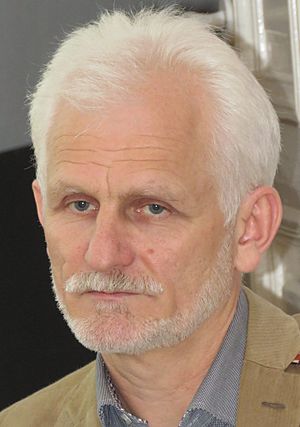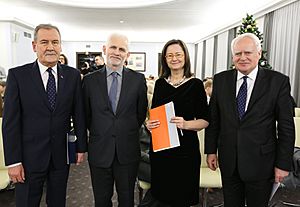Ales Bialiatski facts for kids
Quick facts for kids
Ales Bialiatski
|
|
|---|---|
| Алесь Бяляцкі | |

Bialiatski in 2015
|
|
| Born | 25 September 1962 Vyartsilya, Karelian ASSR, Russian SFSR, Soviet Union (now Republic of Karelia, Russia)
|
| Other names | Aliaksandr Bialiatski |
| Education | Gomel State University (BA) |
| Occupation | https://freeales.org/en# |
| Employer | Viasna Human Rights Centre |
| Spouse(s) | Natallia Pinchuk |
| Awards |
|
Ales Viktaravich Bialiatski (Belarusian: Алесь Віктаравіч Бяляцкі, romanized: Aleś Viktaravič Bialacki; born 25 September 1962) is a brave human rights defender from Belarus. He works to protect people's rights and help bring democracy to his country. He is the head of the Viasna Human Rights Centre.
Ales Bialiatski has been a strong voice for independence and democracy in Belarus since the 1980s. He helped start Viasna and the Belarusian Popular Front. Many people, including The New York Times, call him a very important person in the human rights movement in Eastern Europe.
His work to defend human rights has earned him many international awards. In 2020, he received the Right Livelihood Award, sometimes called the "Alternative Nobel Prize." In 2022, Ales Bialiatski won the famous 2022 Nobel Peace Prize. He shared this award with two organizations: Memorial and Centre for Civil Liberties.
Bialiatski has been put in prison two times. First, from 2011 to 2014, and then again since 2021. Both times, he was accused of not paying taxes. However, many human rights activists believe these accusations were made to stop his important work.
On March 3, 2023, Bialiatski was sentenced to ten years in prison. The charges were related to money and helping groups that protested. Human rights activists believe these charges were made up to silence him, especially after he won the Nobel Peace Prize.
Contents
About Ales Bialiatski
Early Life and Education
Ales Bialiatski was born in Vyartsilya, which is now in Karelia, Russia. His parents were from Belarus. In 1965, his family moved back to Belarus and settled in Svietlahorsk.
Ales studied Belarusian literature at Francisk Skorina Gomel State University. He graduated in 1984. After college, he worked as a schoolteacher for a short time. He also served in the army from 1985 to 1986.
Standing Up for Rights
Bialiatski became a key figure in the Belarusian Popular Front in the 1990s. He was a secretary and then a deputy chairman.
In 1996, he started the Viasna Human Rights Centre. This group helps people whose rights have been violated. In 2003, the government tried to stop Viasna from working by canceling its official registration. But Viasna continued its important work without being officially registered.
Bialiatski also worked with other international human rights groups. He was a vice-president of the International Federation for Human Rights (FIDH) for many years. He is also a member of the Union of Belarusian Writers.
First Arrest and Release
On August 4, 2011, Ales Bialiatski was arrested. He was accused of not paying taxes. He said the money was used to help Viasna's human rights activities.
On October 24, 2011, he was sentenced to 4½ years in prison. Many people around the world, including leaders from the European Union and the United States, said he was a prisoner of conscience. They believed his arrest was because of his human rights work.
Organizations like Amnesty International and Human Rights Watch called for his immediate release. They said his arrest was meant to stop his work.
Bialiatski was held in a prison in Babruysk. He faced difficult conditions there. He was released early on June 21, 2014, after spending 1,052 days in prison.
The day of his arrest, August 4, is now celebrated every year as the International Day of Solidarity with the Civil Society of Belarus.
Recent Arrest and Trial
After his release in 2014, Bialiatski continued his work. He became part of the Coordination Council during the 2020 Belarusian protests.
On July 14, 2021, police searched the homes of Viasna's workers. Bialiatski and his colleagues were arrested again. On October 6, 2021, he was charged with tax evasion.
His trial began in January 2023. Amnesty International said the trial was unfair. They believed it was a way for the government to get revenge for his activism.
On March 3, 2023, Ales Bialiatski was found guilty. He was sentenced to 10 years in prison. Human rights groups believe these charges were made up to silence him and his movement.
International Recognition
Ales Bialiatski is known worldwide for his work. The New York Times called him a "pillar of the human rights movement."
He has received many awards for his efforts:
- In 2006, he won the Homo Homini Award and the Swedish Per Anger Prize. He also received the Andrei Sakharov Freedom Award.
- In 2012, the Parliamentary Assembly of the Council of Europe gave him the Václav Havel Human Rights Prize. His wife accepted it for him because he was in prison.
- He also received the Lech Wałęsa Award in 2012 for promoting democracy and human rights.
- In 2014, he was named civil rights defender of the year by the Swedish Civil Rights Defenders group.
- In 2020, he shared the Right Livelihood Award, known as the "Alternate Nobel Prize."
- He also received the Sakharov Prize from the European Parliament in 2020.
Bialiatski has been made an honorary citizen of several cities, including Genoa, Paris, and Syracuse, Sicily.
In 2022, Ales Bialiatski won the 2022 Nobel Peace Prize. He shared it with two important organizations. Before this, he had been nominated for the Nobel Peace Prize five times.
After he won the Nobel Peace Prize, many people in Belarus celebrated. Sviatlana Tsikhanouskaya, a leader of the Belarusian opposition, said the prize was important for all Belarusians fighting for freedom.
References in Art and Media
Ales Bialiatski's story has inspired many artists and writers.
- Viktar Sazonau's book "The Poetry of the Prose" (2013) has a story based on Bialiatski's experiences.
- Uladzimir Niakliayeu wrote a poem for Bialiatski's 50th birthday.
- The film "Vyshe Neba" (2012) shows an episode about his arrest.
- Several documentaries have been made about him, including "Ales Bialiatski's Candle of Truth" (2011) and "A Heart That Never Dies" (2015).
- Artist Ai Weiwei even created a portrait of Bialiatski using Lego bricks.
Personal Life
Ales Bialiatski is married to Natallia Pinchuk. They met in 1982 when they were students. They got married in 1987. Ales and Natallia have a son named Adam. Ales is a Roman Catholic.
When he was in college, Bialiatski played bass guitar in a band called Baski. Today, his main hobbies are mushroom hunting and planting flowers. He usually speaks the Belarusian language.
See also
 In Spanish: Alés Bialiatski para niños
In Spanish: Alés Bialiatski para niños
 | Selma Burke |
 | Pauline Powell Burns |
 | Frederick J. Brown |
 | Robert Blackburn |


